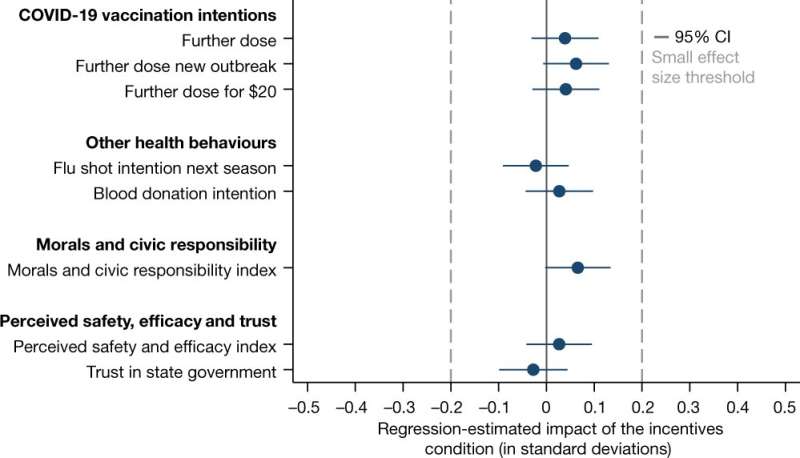This article has been reviewed according to Science X's editorial process and policies. Editors have highlighted the following attributes while ensuring the content's credibility:
fact-checked
peer-reviewed publication
trusted source
proofread
Paying people to take COVID vaccine worked well, study finds

A study finds that paying people to take a first dose of a COVID-19 vaccine didn't lower the likelihood of seeking the second or third dose or of other positive health behaviors and didn't erode morals, sense of civic duty, or feelings of self-determination.
The study, led by Swiss and Swedish researchers, was published yesterday in Nature. The researchers note that, while financial incentives to encourage healthy and prosocial behaviors often generate initial behavioral change, critics say that they can corrode prosocial motivations, lead to moral decay, and increase feelings of coercion, reducing the likelihood of practicing healthy behaviors without a payment.
The team offered 1,131 Swedish participants in a previous randomized, controlled trial (RCT) 200 Swedish krona (SEK), or roughly $24 US, to receive a first COVID-19 vaccine dose within 30 days. That group was compared with 3,888 matched participants not offered the incentive.
Just as likely to seek subsequent doses
The researchers combined the RCT data with vaccination records on second-dose uptake and survey results from January (first dose uptake) and June 2022 (third dose). A total of 726 participants in the financial incentive group and 2,512 controls responded to the first survey, and 606 and 2,100, respectively, completed the second.
The payment boosted uptake by four percentage points 30 days after the trial ended. Uptake remained elevated for at least three months.
The authors identified no negative effects of financial incentives on subsequent planned or actual COVID-19 vaccine uptake or timing, morals, sense of civic duty, trust in vaccination providers or in the safety and effectiveness of vaccines, attitudes toward financial incentives, or feelings of self-determination or coercion.
Nor was there evidence that incentives received in the previous five months for behaviors such as flu shot uptake or blood donation had any negative effects on the decision to receive the COVID-19 vaccine. "Our findings inform not only the academic debate on financial incentives for behavior change but also policy-makers who consider using financial incentives to change behavior," they wrote.
More information: Florian H. Schneider et al, Financial incentives for vaccination do not have negative unintended consequences, Nature (2023). DOI: 10.1038/s41586-022-05512-4



















